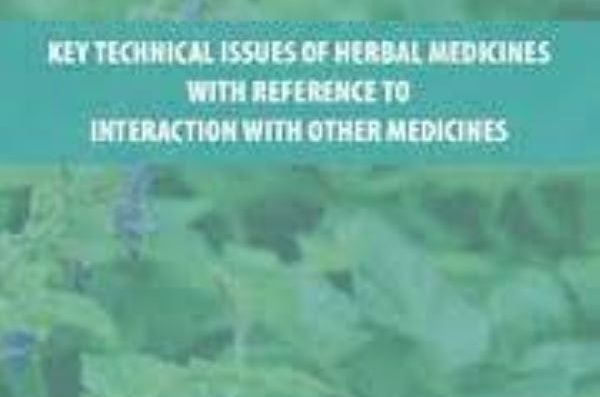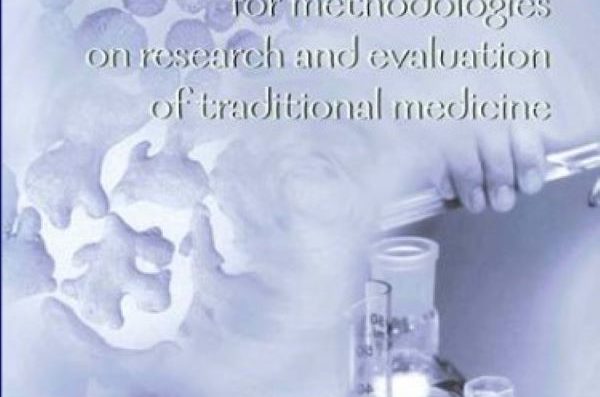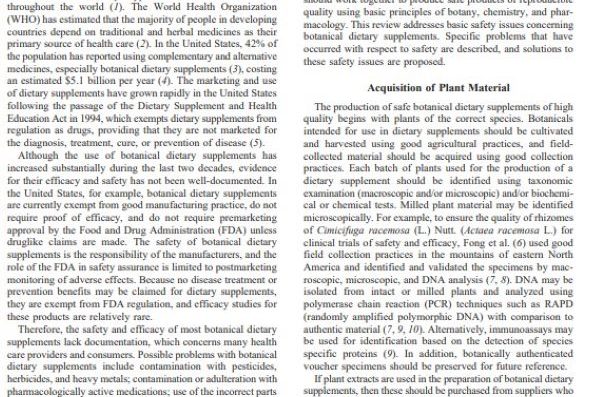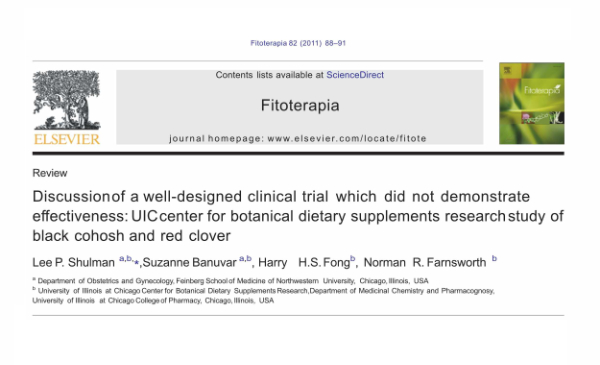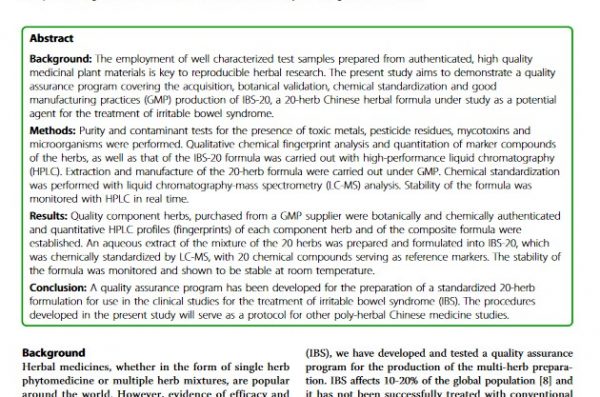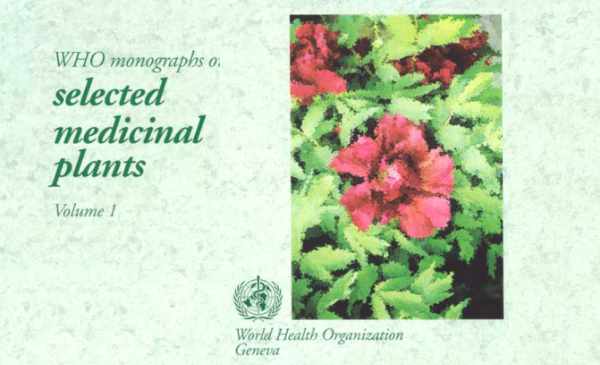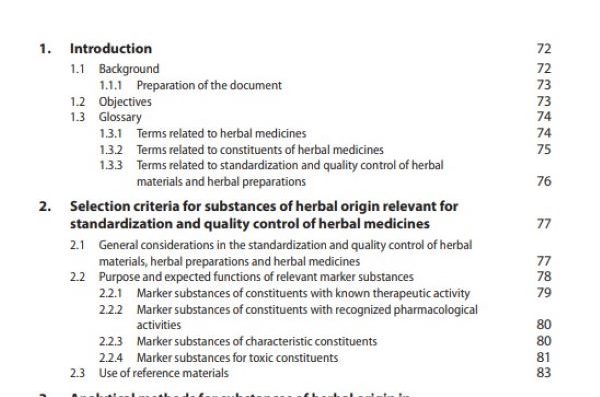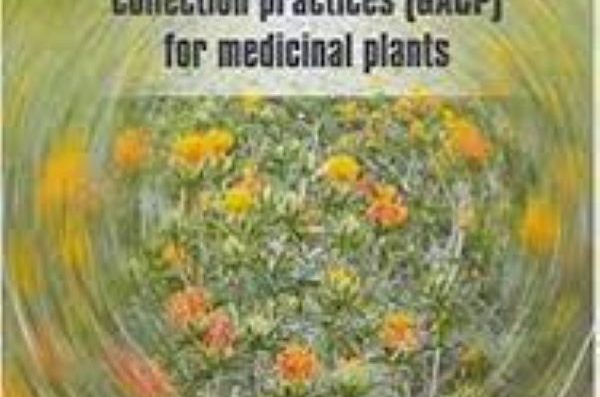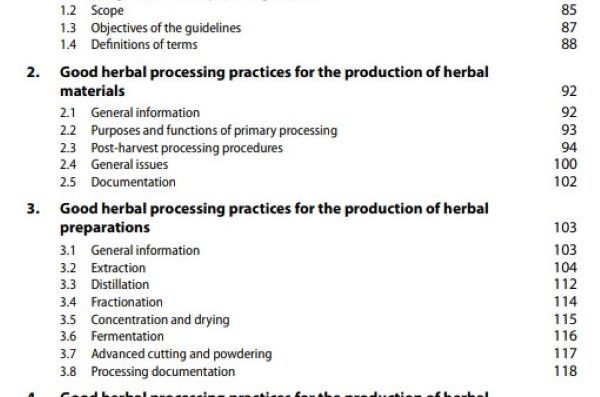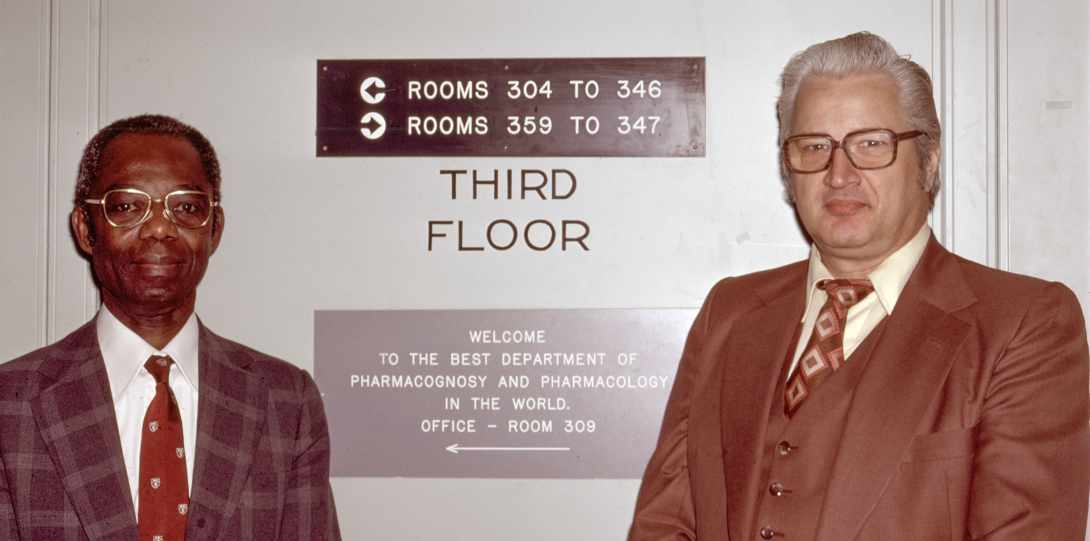Our WHO TRM CC/UIC is One of 27 Centers Worldwide under WHO's TCI Programme
The WHO Collaborating Centre for Herbal Medicines at the UIC College of Pharmacy (WHO TRM CC/UIC) is one of 27 designated centers in the world under the WHO's Unit of Traditional, Complementary and Integrative Medicine (TCI), Department of Integrated Health Services. Sister centers are located in South America (AMRO/PAHO, 1), Europe (EURO, 3), Southeast Asia ( SEARO, 4) and Western Pacific (WPRO, 18) regions.
UIC is one of the inaugural (1981) longest-standing WHO TRM CC in WHO's AMRO (America Regional Offices)/PAHO (Pan American Health Organizations) following the inception of the WHO Traditional Medicine Program (around 1977). This site provides details about this program, its some 40-years of activities, and links to relevant publications and documents, organized into sections related to Organization, Activity Portfolio, and History, as well as a Photo Gallery of Key Events.
Representative Traditional Medicine-Related Publications Contributed by WHO TRM CC/UIC Members
Activity Portfolio of the UIC WHO TRM CC/UIC
Since inception, our Centre has ably served as a technical and information resource in support of WHO’s efforts in the promotion and development of traditional, complimentary and integrative (TCI) medicine. Our Centre’s current Key Activities, Terms of Reference (TOR), Leadership History, Collaborative Research Units/Projects, Consultations & ad hoc Assignments including Workshops, and Publications are described herein.
Activity Area 1 | Advocacy for Traditional Medicine Research and Practice
The WHO TRM CC/UIC has been a passionate advocate for enhancing traditional medicine research and practice. In addition to the leadership team, other faculty members who had served as WHO advisors and consultants (STA/STC) include Professors Chris Beecher, Geoffrey Cordell, Gail Mahady, Doel D. Soejarto, and Donald P. Waller.
Our Center has been actively involved in many WHO-initiated activities to promote safe and effective use of traditional and complementary medicine (T&CM) through regulation, research, education, and training. We participate in the development of technical documents (such as guidelines and benchmarks), organize and conduct training workshops for researchers and government officials, as well as provide research training opportunities for researchers from WHO member states. Members of the Centre frequently attend WHO consultations and scientific meetings.
An important role of our Centre is to assist in the implementation of the WHO Traditional Medicine Strategy.
Activity Area 2 | Informatics & Training
Established in 1975 at UIC by the late Professor Norman Farnsworth (inventor and chief editor), the NAPRALERT Database is a computerized relational database containing a rich collection of worldwide literature on the ethnobotany, chemistry, pharmacology, toxicology, and clinical reports on medicinal plants. To date more than 200,000 scientific papers and reviews are included in NAPRALERT, representing organisms from all countries of the world, including marine and microorganisms. Access to the NAPRALERT database was granted to the WHO TCI and sister CC’s through requests to WHO TCI or its Regional Office counterparts. Over the years, the Database has served thousands of researchers all over the world. NAPRALERT is accessible at napralert.org and offers limited free searches as well as supported search capabilities to its users.
Apart from offering literature data and information to individual researchers, the NAPRALERT database has provided literature references for the development of WHO guidelines/technical documents, such as the WHO guidelines on Good Herbal Processing Practices (GHPP) for herbal medicines (2018), the Key technical issues for the safe use of herbal medicines with reference to interaction with other medicines (2019), and the Key technical issues of herbal medicines with reference to interaction with other medicines (2021).
Since the inception of the WHO TRM CC/UIC, we offered special courses, workshops, and short-term bench-side technical training in medical botany, medicinal plant chemistry and analysis, biology, pharmacology, toxicology, clinical evaluation as well as research administration to hundreds of visiting scientists/scholars and post-graduate students from many WHO member states. We also served as faculty members/mentors in providing on-site professional and research trainings at venues chosen by WHO TRM, including Thailand, Zimbabwe, Vietnam, and China.
Activity Area 3 | Monographs & Guidelines
Members of the WHO CC TRM/UIC have made major contributions to the publication of WHO Monographs and Guidelines in drafting/preparation of the documents :
- Four volumes of “WHO Monographs of Selected Medicinal Plants (Vol. I-IV) (1999-2009)” (N.R. Farnsworth, H.H.S. Fong, G. Mahady)
- The “General Guidelines for Methodologies on Research and Evaluation of Traditional Medicine (2000)” (H.H.S. Fong)
- The “WHO Guidelines on Good Agricultural and Collection Practices (GACP) for Medicinal Plants (2003)” (H.H.S. Fong)
- The “WHO Monographs on Medicinal Plants Commonly Used in the Newly Independent States (NIS) (2007)” (N.R. Farnsworth).
- The “WHO Guidelines on Good Herbal Processing Practices (GHPP) for Herbal Medicines (2018)” (H.H.S. Fong, C.T. Che)
- The “Key Technical Issues of Herbal Medicines with Reference to Interactions with Other Medicines (2021)” (H.H.S. Fong, C.T. Che)
TOR 1
To support WHO in the implementation of the WHO Traditional Medicine Strategy 2014-2023, by developing and providing technical inputs and scientific information to WHO on herbal medicines. It includes the following activities:
(a) Establish research collaborations with other WHO TRM CCs and WHO member states to support development of TCI goods and contribute to strengthening quality assurance, safety, proper use and effectiveness of herbal medicinal products;
(b) Share evidence-based information and research expertise by offering research exchange/training opportunities to other WHO TRM CCs and WHO member states;
(c) Develop technical inputs on the quality and safety of herbal medicine, phytochemical studies on medicinal plants, pharmacology of plants and natural products, as well as clinical evaluation of herbal products.
TOR 2
To provide literature information from the NAPRALERT (NAtural PRoducts ALERT) Database and other sources to inform WHO on the quality, safety, and effectiveness of herbal medicines and TCI products. This includes the following activity: Collect, collate and analyze literature data and information on medicinal plants and natural products using the in-house NAPRALERT Database and other means of data search mechanisms.
TOR 3
To provide technical input to WHO in support of update of the WHO International Herbal Pharmacopoeia (IHP) and other technical documents. This includes the following activities:
(a) Provide technical assistance and laboratory service for developing specific tools and technical documents including monographs on herbal medicines during the WHO IHP development process;
(b) Support WHO in the development of guidelines/technical documents;
(c) Provide expertise opinions and advice on scientific, professional, policy, and other related issues of traditional medicine and TCI products.
Norman R. Farnsworth
Professor Norman R. Farnsworth served as the founding Director of the WHO TRM CC at UIC, and led it for the next 30 years. He was an appointed member of the WHO Expert Advisory Panel on Traditional Medicine from 1980 until 2011. In addition to working with Dr. Bannerman in the formative years of the WHO TRM Programme, Dr. Farnsworth also frequently served as a STA/STC on consultation/workshop/ad hoc project assignments (1980-2011). Over the years, Professor Farnsworth worked with Drs. R.H. Bannerman, O. Akerele, X. Zhang, and Q. Zhang of the WHO TRM Programme to provide expertise in strategic planning and programmatic development on TRM and public health on such issues as professional and research training and informatics, including databases, monographs of medicinal plants, and research guidelines.
Harry H.S. Fong
Professor Harry H.S. Fong served as the CC’s Program Coordinator 1985 -2000, and as Associate/Co-Director 2001-2017. He has also been serving as a member of the WHO Expert Panel on Traditional Medicine from 1997-2017, and as a member of the WHO Expert Panel on Traditional, Complementary and Integrative Medicine (2017-2021). He actively serves as a STA for WHO TRM on consultations/workshops/ad hoc projects; as well as fro project-specific in-country STC assignments for its regional offices (AMRO, EMRO, SEARO, and WPRO). Professor Fong also served as primary/co-drafter, editor or contributing eidtor of a number of WHO technical guidelines and publications, including the four volumes of WHO Monographs on Selected Medicinal Plants, the WHO Guidelines on Good Agricultural and Collection Practices (GACP) for Medicinal Plants, the WHO Guidelines on Good Herbal Processing Practices (GHPP) for Herbal Medicines, and the Key Technical Issues of Herbal Medicines with Reference to Interactions with Other Medicines“.
Chun-Tao Che
Professor Chun-Tao Che succeeded Professor Farnsworth as Director of the WHO TRM CC/UIC on the passing of the latter in 2011. Prof. Che led the successful continued re-designation of UIC College of Pharmacy as a WHO TRM CC: in 2015 with Professor Harry Fong as a Co-director, and in 2020 with Professor Guido Pauli as Co-director. Dr. Che has actively served as an STA, rapporteur, or participant at many WHO consultation meetings, and was a co-drafter and co-editor of the WHO Guidelines on Good Herbal Processing Practices (GHPP) for Herbal Medicines. He also assisted in the preparation and revision of the Key Technical Issues of Herbal Medicines with Reference to Interaction with Other Medicines.
Guido F. Pauli
Professor Guido F. Pauli succeeded Professor Harry Fong administratively as Co-Director of the the WHO TRM CC/UIC effective October 2017. Appointed as the Norman R. Farnsworth Professor of Pharmacognosy at UIC’s College of Pharmacy, Prof. Pauli has provided expertise assistance in the preparation and review of several WHO Technical Documents: the WHO Benchmarks for Training in Anthroposophic Medicine, the document Key Technical Issues for Herbal Medicines with Reference to Interaction with Other Medicines, and the WHO technical Document on Clinical Research in Traditional and Complementary Medicine.
Collaborations Relate to Traditional, Complementary, and Integrative Medicine Research Units, Facilities, and Ad Hoc Projects
In addition to carrying out mandated activities in support of the TOR, our Center members concurrently conduct traditional, complementary and integrative medicines research sponsored by governmental and non-governmental organizations on subjects ranging from the use of medicinal plants for fertility regulations to the quality analysis and clinical evaluation of botanicals in complementary/integrative medicine for women’s health.
In all these years, the Center has undertaken collaborative activities with the WHO and other member states in promoting the use of safe and effective traditional medicine. In particular, the Center provides expertise to support the implementation of WHO tasks and mission through inter-center research collaboration, particularly in the areas of quality, safety and effectiveness of herbal medicines as well as rational use of traditional medicines and botanical dietary supplements. the Centre also devotes to promoting and strengthening TCI research in other CCs and WHO member states through exchange and training research personnel, in the areas of phytochemical studies on medicinal plants, pharmacology of plants and natural products, as well as quality and safety of herbal medicines and TCI products.
The knowledge generated from the TCIM research carried out by the above units, facilities and projects enhanced the work of the WHO TRM CC/UIC. The new knowledge gained have been disseminated in the form of research papers, review papers, chapters in books, books edited, and documented in the “Publications” section
Ongoing and Previous Collaborations
Inter-Centre Research Collaborations:
- WHO CC TRM/RMIT (Australia)
- WHO CC TRM/Hong Kong
International Collaborations:
Our Centre has established working relationships with over 20 WHO member states in research collaboration, exchange and training of research personnel, conducting workshops/training programs, and joint educational/scientific events.
Internal Collaborations:
Our Centre has been working closely with other units within the UIC College of Pharmacy including:
- The NAPRALERT database of ethnomedicine, ethnobotanicals, and bioactive natural products (1975-present)
- World Health Organization, Special Programme for Research, Development and Research Training in Human Reproduction, Task Force on Indigenous Plants for Fertility Regulation, Collaborating Centre (1977-1988)
- UIC/NIH Center for Botanical Dietary Supplements Research (1999-2019)
- Institute for Tuberculosis Research ( 2000-present)
- Center for Natural Product Technologies (CeNAPT) (2015-present)
- Program for Collaborative Research in the Pharmaceutical Sciences (PCRPS) (1982-present)
- American Botanical Council: Methods development and analysis of ginsenosides in OTC products. (1993-1996)
- NIH/NCCAM International Center for Research on Complementary and Alternative Medicine (ICRC) (2005-2010)
WHO/TRM Director of CC Meetings
- World Health Organization, First Meeting of Directors of Collaborating Centres for Traditional Medicine, WHO, Geneva, 1981 (NR Farnsworth)
- World Health Organization Meeting of Directors of Collaborating Centres for Traditional Medicine, Beijing, People’s Republic of China, 1987 (NR Farnsworth, rapporteur)
- Third Meeting of Directors of WHO Collaborating Centres for Traditional Medicine, Beijing, People’s Republic of China, 1995. (NR Farnsworth, rapporteur)
- Directors of WHO Complementary and Alternative Medicine, Centers, National Institute of Health, Host; Chicago, USA, 2001 (NR Farnsworth)
- World Health Organization Meeting of Directors of Collaborating Centres for Traditional Medicine, Beijing, People’s Republic of China, 2011 (CT Che and S Swanson, co-rapporteur))
- World Health Organization Meeting of Directors of Collaborating Centres for Traditional Medicine, Salsomaggiore, Italy, 2015 (CT Che, rapporteur)
- World Health Organization Meeting of Directors of Collaborating Centres for Traditional Medicine,
- World Health Organization Meeting of Directors of Collaborating Centres for Traditional Medicine, xxxxxx, xxx. 201x (CT Che)
WHO TRM (Geneve) Consultations and In-Country Services
- WHO Working group meeting, “Consultation on Potentials for use of Plants Indicated by Traditional Medicine in Cancer Therapy” WHO, Geneva, 1978 (NR Farnsworth, Rapporteur)
- Clinical Evaluation of Traditional Medicines and Natural Products or AIDS. Geneva, 1984 (NR Farnsworth, STA)
- “Inter-Regional Workshop on Appropriate Methodology for the Selection and use of Traditional Remedies in Primary Health Care”. Bangkok, Thailand, 1985 (HHS Fong, DP Waller)
- Intercountry Workshop on the Selection and use of Traditional Remedies in Primary Health Care. Harare, Zimbabwe, 1989 (N Farnsworth, DP Waller)
- Consultation on AIDS and Traditional Medicine: Prospect for Involving Traditional Health Practitioners. Francistown, Botswana, 1990 (H. Fong, STA, Rapporteur)
- Consultation on Traditional Medicine and AIDS: Clinical Evaluation of Traditional Medicines and Natural Products. Geneva, 1990. (N Farnsworth, STA)
- Draft Guidelines for the Assessment of Herbal Medicines, Munich, Germany, 1991. Sponsored by the World Health Organization and the International Proprietary Drug Manufacturer’s Association. (N Farnsworth: Prepared a background document and served as “observer”).
- Consultation on Model Monographs of Widely Used Medicinal Plants. Munich, Germany, 1996. (N. Farnsworth, STA)
- Conference on Research Methodology on Traditional Medicine, Rockville, MD, USA, 1997. (H. Fong, Rapporteur/Writer)
- Consultation on WHO Monographs on Selected Medicinal Plants, Vol. 1, Munich, Germany, 1997. (N. Farnsworth: STA and Conf. Chair; H. Fong, and G. Mahady: STA’s and Session Chairs)
- Consultation on WHO Monographs on Selected Medicinal Plants, Vol. 2 Salerno-Rovello, Italy, 1999. (N. Farnsworth: STA and Conf. Chair; H. Fong, and G. Mahady: STA’s and Session Chairs)
- Consultation on Methodologies for Research and Evaluation of Traditional Medicine. Hong Kong, China, April 2000 (H. Fong, STA).
- WHO TRM – Hong Kong Department of Health. Consultation on Methodologies for Research and Evaluation of Traditional Medicine-Pre-consultation Seminar. Hong Kong, China, 2000. (H. Fong)
- Third Consultation on WHO Monographs on Selected Medicinal Plants, Vol. 3, (Ottawa, Canada), 2001. (N. Farnsworth: STA and Conf. Chair; H. Fong, and G. Mahady: STA’s and Session Chairs)
- Informal Meeting on Methodologies for Quality Control of Finished Herbal Products. Ottawa, Canada, 2001. (N. Farnsworth: STA and Conf. Chair; H. Fong, and G. Mahady: STA’s)
- Consultation on Good Agricultural and Field Collection Practices for Medicinal Plants. Geneva, 2003 (H Fong: STA and Writer)
- Consultation on Contaminants and Residues in Herbal Medicines”, Milan-Loveno di Menaggios, Italy, 2004 (H Fong, STA)
- Consultation on Selected Medicinal Plants. Vol. 4, Salerno-Paestum, Italy, 2005. (N. Farnsworth: STA and Conf. Chair; H. Fong, and G. Mahady: STA’s and Session Chairs)
- Consultation on Conservation of Medicinal Plants”, Toyama, Japan, 2011. (H. Fong, STA)
- The Second Local Training Workshop on Good Manufacturing Practice (GMP) Macao, China, 2013 (H. Fong, CT Che, STA’s)
- The Second WHO consultation on quality control of herbal medicines , Hong Kong, China, 2014 (H Fong, STA, and Conference Chair on reviewing the WHO guideline for selecting marker substances of herbal origin for quality control of herbal medicines); (CT Che, Participant); H Fong and CT Che: co-drafters of the document: WHO guideline on good herbal processing practices of herbs and herbal materials.
- WHO Second Working Group Meeting on Interaction of Herbal Medicines with Other Medicines, Oxford, Mississippi, USA, 2016. (H. Fong, STA)
- First WHO Interregional Training Workshop on Quality of Traditional and Complementary Medicine Services; Macao, China, 2016 (CT Che, STA)
- Second WHO Interregional Training Workshop on Quality of Traditional and Complementary Medicine Services; Macao, China, 2017 (CT Che, STA)
- The 3rd WHO Consultation on the Quality of Traditional Medicines. Hong Kong, China, 2017. (H. Fong, STA; CT Che, rapporteur)
- WHO Consultation Meeting on Key Technical Issues for Herbal Medicines with Reference to Interaction with Other Medicines, Beijing, China, 2019 (H. Fong, STA; CT Che, Rapporteur)
Consultations and In-Country Services for Regional Offices
AMRO/PAHO Consultations and In-Country Services
- WHO/PAHO Workshop on Traditional Medicine, Kingston, Jamaica, 2000. (H Fong, STC)
- WHO/PAHO Workshop on Policies, Plans, and Programs on Traditional and Complementary Medicine in the Americas, 2001. (H Fong, STC)
- WHO/PAHO Regional Meeting on Traditional Medicine, Guatemala City, Guatemala, 2003 (H Fong, STC)
- WHO/PAHO Meeting of the Working Group on Medicinal Plants of the Pan American Network of Drug Regulatory Harmonization (PANDRH), Guatemala City, Guatemala, 2003. (H Fong)
- WHO/PAHO Traditional, Complementary and Alternative Medicine and Therapies into National Health Systems Workgroup. Washington, D.C., U.S.A., 2003 (H Fong)
EMRO Consultations and In-Country Services
- WHO/EMRO In-country Consultation on the Quality Control of Traditional and Complementary Medicines, Riyadh, Saudi Arabia, 1994. (H. Fong, STC)
- WHO/EMRO In-country Assessment of Status of Traditional and Medicines, Khartoum, Sudan, 1995. (H. Fong, STC)
SEARO Consultations and In-Country Services
- WHO/SEARO WHO Interregional Workshop on Intellectual Property Rights in the Context of Traditional Medicine, Bangkok, Thailand, 2000, (D. Soejarto)
- WHO/SEARO Assessments of Collaborative Research in Herbal Medicines, Ministry of Health, Jakarta, Indonesia, 2000 (H. Fong, STA)
- International Conference on Traditional Medicine for South-East Asian Countries, New Delhi, India, 2013. (CT Che, STA)
- WHO/SEARO Regional Expert Group Meeting on Strengthening Clinical Research Capacity on Safety, Efficacy and Quality of Care of Traditional Medicines, New Delhi, India, 2013 (H. Fong, STA)
WPRO Consultations and In-Country Services
- WHO/WPRO, In-country Consultation on Traditional Medicine and AIDS. Beijing-Shanghai-Hangzhou, PRC. 1990 (H. Fong, CT Che; STC’s)
- WHO/WPRO, In-country Assessment of Status of Traditional Medicines. Phnom Penh, Cambodia, 1995. (H. Fong, STC)
- WHO/WPRO, “Medicinal Plants of the South Pacific”, WHO Regional Publications, Manila, Philippines, 1998, 254 pp. (GA Cordell, Technical Advisor and Editor)
- WHO/WPRO, “Medicinal Plants of the Republic of Korea”, WHO Regional Publications, Manila, Republic of the Philippines, 1998, 326 pp. (Cordell, G.A., Technical Advisor and Editor)
- WHO/WPRO, In-country Assessment of Status of Traditional Medicines; Drafting of a strategic plan for the incorporation of Traditional Medicine in Papua New Guinea’s National Health Plan 2001-2010. Papua New Guinea, 1999 (H. Fong, STC).
- WHO/WPRO, In-country Workshop on Research Methodologies on Herbal Medicine and Assessment of Status of Traditional Medicines in Vietnam. Hanoi, Ho Chi Minh City, Vietnam, 1999 (H. Fong, STC).
- WHO/WPRO, Viet Nam – WHO Training Course on Traditional Pharmacy, Ministry of Health, Ninh Binh, Viet Nam, 1999. (H. Fong, STC).
- WHO/WPRO, Regional Workshop on Traditional Practice of Medicine and Health Sector Development, Apia, Samoa, 2000. (H Fong, STC)
- WHO/WPRO, The Working Group on Harmonization of Standards and Regulatory Framework of Herbal Medicines meeting, Seoul, Republic of Korea, 2001. (H Fong, STC)
- WHO/WPRO, The Second Consultation Meeting on Traditional and Modern Medicine: Harmonizing the Two Approaches. Gyeongju, Republic of Korea, 2003, (H Fong, STC)
- WHO/WPRO, Consultancy for the Institute of Medical Research, Ministry of Health, Government of Malaysia, Kuala Lumpur, Malaysia on “Management of Herbal Research Centres”.2005, (GA Cordell, STC).
- WHO/WPRO, “The Regional Strategy for Traditional Medicine in the Western Pacific (2011-2020)“, WHO Western Pacific Regional Office, Manila, Republic of the Philippines, 60 pp. 2012. (GA Cordell, STC)
- WHO/WPRO, “Medicinal Plants of Mongolia”, WHO Regional Publications, Manila, Republic of the Philippines, 2013, pp. 248.(Cordell, G.A., Technical Advisor and Editor)
- WHO/WPRO, Extended consultancy for an analysis of the Traditional Medicine systems in Korea, China and Japan, and the development of a new set of Strategic Objectives for the Western Pacific Region of WHO in the area of Traditional Medicine, 2011, (GA Cordell, STC)
- WHO/WPRO, Special Expert Advisor at Shanghai University of Traditional Chinese Medicine, March, 2013. (GA Cordell, STA)
- WHO/WPRO, Special Expert Advisor at Shanghai University of Traditional Chinese Medicine, 2013. (GA Cordell, STA)
- WHO/WPRO-Hong Kong Health Department-Hong Kong University of Science and Technology Training Workshop on Quality Control of Herbal Medicine. Hong Kong, China, 2013 (H Fong, STA)
Ad Hoc Projects
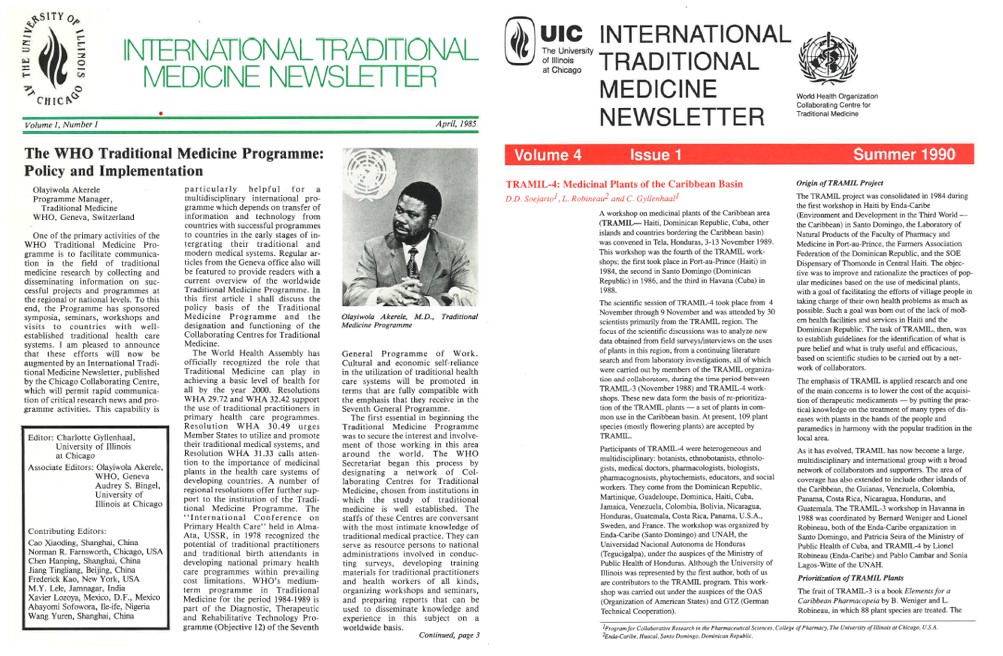
To promote communication and sharing of ideas among the network of WHO TRM Collaborating Centres, the WHO TRM CC/UIC launched a quarterly newsletter, “UIC International Traditional Medicine Newsletter” under the editorship of Dr. Charlotte Gyllenhaal (1985-1987) and Dr. Harry Fong (1988-1990), a forerunner of the WHO TRM Newsletter (edited by the WHO TRM CC at RMIT).
Among the globally recognized ad hoc projects undertaken by members of our Centre are the following monographs and guidelines for WHO TRM are the following:
- WHO Monographs on Selected Medicinal Plants. Volume 1, World Health Organization, Geneva, Switzerland, 1999. (Mahady GB, Fong HHS, Farnsworth NR. Eds.)
- WHO Monographs on Selected Medicinal Plants. Volume 2, World Health Organization, Geneva, Switzerland, 2002. (Mahady GB, Fong HHS, Farnsworth NR. Eds.)
- WHO Monographs on Selected Medicinal Plants. Volume 3, World Health Organization, Geneva, Switzerland, 2007. (Mahady GB, Fong HHS, Farnsworth NR. Eds.)
- WHO Monographs on Selected Medicinal Plants. Volume 4, World Health Organization, Geneva, Switzerland, 2009. (Mahady GB, Fong HHS, Farnsworth NR. Eds.)
- General Guidelines on Research and Evaluation of Traditional Medicine. World Health Organization, Geneva, Switzertland, 2002 (Fong HHS, draft/edit)
- WHO Guidelines on Good Agricultural and Collection Practices (GACP) for Medicinal Plants. Geneva, Switzerland, World Health Organization, 2003. (Initial draft prepared by Fong HHS, Simon JE, Regalado J).
- WHO Guidelines on Good Herbal Processing Practices (GHPP) for Herbal Medicines. Geneva, Switzerland, World Health Organization, 2018 (H Fong , CT Che, draft and edit)
- Key technical issues of herbal medicines with reference to interaction with other medicines, World Health Organization, 2021 (H Fong , CT Che, edit)
Selected papers on quality analysis/assurance/control
- F. Fitzloff, P. Yat, Z.Z. Lu, D.V.C. Awang, J. T.Arnason, R. B. van Breemen, T. Hall, M. Blumenthal and H.H.S. Fong. Perspectives on the quality assurance of ginseng products in North America. Proc. 7th Intern. Ginseng Symp., Sept. 22-25, 1998, Seoul, Korea (1998).
- W.-k. Li, C.-g. Gu, H.-j. Zhang, D.V.C. Awang, J.F. Fitzloff, H.H.S. Fong, R.B. van Breemen. Use of high performance liquid chromatography-tandem mass spectrometry to distinguish Panax ginsengA. Meyer (Asian ginseng) and Panax quinquefolius L. (North American ginseng). Analytical Chemistry , 72: 5417-5422, 2000.
- T. Hall, Z.Z. Lu, P.N. Yat, J.F. Fitzloff, J.T. Arnason, D.V.C. Awang, H.H.S. Fong, M. Blumenthal. An introduction to the ginseng evaluation program. HerbalGram, 52:27-30, 2001.
- T. Hall, Z.Z. Lu, P.N. Yat, J.F. Fitzloff, J.T. Arnason, D.V.C Awang, H.H.S. Fong, M. Blumentha. Evaluation of consistency of standardized Asian ginseng products in the ginseng evaluation program. HerbalGram, 52:31-45, 2001.
- W. Li, H.H.S. Fong, K.W. Singletary, J.F. Fitzloff. Determination of catechins in commercial gape seed extract. Journal of Liquid Chromatography & Related Technology, 25:397-407, 2002.
- W. Li, J.F. Fitzloff, N.R. Farnsworth, H.H.S. Fong. Evaluation of commercial Ginkgo biloba dietary supplements for the presence of colchicine by high-performance liquid chromatography. Phytomedicine, 9:442-446, 2002.
- W. Li, S. Chen, D. Fabricant, C.K. Angerhofer, H.H.S. Fong, N.R. Farnsworth, J.F. Fitzloff. High-performance liquid chromatographic analysis of black cohosh (Cimicifuga racemosa) constituents with in-line evaporative light scattering and photodiode array detection. Analytica Chimica Acta, 471:61-75, 2002.
- H. Xu, D.S. Fabricant, C.E. Piersen, J.L. Bolton, J.M. Pezzuto, H.H.S. Fong, S. Totura, N.R. Farnsworth, A.I. Constantinou. A preliminary RAPD-PCR analysis of Cimicifuga species and other botanicals used for women’s health. Phytomedicine, 9:757-762, 2002.
- W. Li, Y. Sun, J. Joseph, J.F. Fitzloff, H.H.S. Fong, R.B. van Breemen. p-Hydroxybenzoic acid alkyl esters in Andrographis paniculata herbs, commercial extracts and formulated products. Journal of Agricultrual Food Chemistry, 51:524-529, 2003.
- E.B. Asafu-Adjaye, S.K. Wong, J. Arnason, J. Betz, K. Breakell, J.X. Chen, J. Fitzloff, H.H.S. Fong, C.S. Kim, S.Y. Kwan, H.W. Leung, G.Q. Li, R.C. Lin, G.A. Luo, H. Nicolidakis, H. Park, E. Suen, X.R. Wang, Z.T. Wang , K.C. Wen, H.W. Yeung. Determination of ginsenosides (ginseng saponins) in dry root powder from Panax ginseng, Panax quinquefolius, and selected commercial products by liquid chromatography: Interlaboratory study. AOAC International. 86:1112-1123, 2003.
- R. Case, E. Chou, D. Soejarto, H.H.S. Fong, S.G. Franzblau, D.C. Smith, G.F. Pauli. CCC in the phytochemial analysis of anti-TB ethnobotanicals. Journal of Liquid Chromatography and Related Technology, 28: 2017-2028, 2005.
- S.P. Ip, M. Zhao, Y.F. Xian, M.L. Chen, Y.Y. Zong, Y.W. Tjong, S.H. Tsai, J.J.Y. Sung, A.Bensoussan, B. BermaH.H.S. Fong, C.T. Che. Quality assurance for Chinese herbal formulae: standardization of IBS-20, a 20-herb preparation. Chinese Medicine, 5:8, 2010.
Selected papers on biological/pharmacological studies
- E. Bowen, A. Druetzler, B. Libelt, W. Hwang, H. Fong, D. Waller and M.C. Moon. Effect of flax seed supplementation on arachidonic acid metabolism. Proc. 54th Flax Inst., USA, January 30-31, 18-23, 1992.
- E. Rickard, L.J. Orcheson, M.M. Seidl, L. Luyengi, H.H.S. Fong and L. U. Thompson. Dose-dependent production of mammalian lignan in rats and in vitro from the purified precursor secoisolariciresinol diglycoside in flaxseed. Journal of Nutrition, 126:2012-2019, 1996.
- M. Jang, L. Cai, G.O. Udeani, K.V. Slowing, C.F. Thomas, C.W. Beecher, H.H.S. Fong, N.R. Farnsworth, A.D. Kinghorn, R.G. Mehta, R.C. Moon, J.M. Pezzuto. Cancer chemopreventive activity of resveratrol, a natural product derived from grapes. Science, 275:218-220, 1997.
- J. Liu, J.E. Burdette, H. Xu, C. Gu, R.B. van Breemen, K. Bhat, N. Booth, A.I. Constantinou, J.M. Pezzuto, H.H.S. Fong, N.R. Farnsworth, J.L. Bolton. Evaluation of estrogrnic activity of plant extracts for the potential treatment of menopausal symptoms. Journal of Agricultural Food Chemistry, 49:2472-2479, 2001.
- J.E. Burdette, S. Chen, Z.Z. Lu, H. Xu, B. White, D.S. Fabricant, J. Liu, H.H.S. Fong, N.R. Farnsworth, A.I. Constantinou, R.B. van Breemen, J.M. Pezzuto, J.L. Bolton. Black cohosh (Cimicifuga racemosa) protects against menadione-induced DNA damage through scavenging of reactive oxygen species: Bioassay directed isolation and characterizations of compounds. Journal of Agricultural Food Chemistry, 50:7022-7028, 2002.
- J.T. Xie, W.T. Chang, C.Z. Wang, S.R. Mehendale, J. Li, R. Ambihaipahar, U. Ambihaipahar, H.H.S. Fong, C.S. Yuan. Curry leaf (Murraya koenigii ) reduces blood cholesterol and glucose levels in ob/ob mice. The American Journal of Chinese Medicine, 34: 279–284, 2006.
- S.S.K. Chan, M. Zhao, L. Lao, H.H.S. Fong, C.T. Che. Magnolol and hinokiol account for the antispasmodic effect of Magnolia officinalis in isolated guinea pig ileum. Planta Medica, 74: 381-384, 2008.
- R. Rajaiaha, D.Y.W. Lee, L. Lao, H.H.S. Fong, B.M. Berman, K.D. Moudgil. Huo-Luo-Xiao-Ling Dan modulates antigen-directed immune response in adjuvant-induced inflammation. Journal of Ethnopharmacology, 123:40–44, 2009.
- R.X. Zhang, A.Y. Fan, A.N. Zhou, K.D. Moudgil, Z.Z. Ma, D.Y.W. Lee, H.H.S. Fong, B.M. Berman, L. Lao. Extract of the Chinese herbal formula Huo Luo Xiao Ling Dan inhibited adjuvant arthritis in rats. Journal of Ethnopharmacology, 121:366–371, 2009.
- Y.H. Yang, R. Rajaiaha, D.Y.W. Lee, Z. Ma, H. Yu, H.H.S. Fong, L. Lao, B.M. Berman, K.D. Moudgil. Suppression of ongoing experimental arthritis by an herbal formula (huo-luo-xiao-ling dan) involves changes in antigen-induced immunological and biochemical mediators of inflammation. Evidence Based Complementary and Alternative Medicine. Article ID 642027, 2011.
- H. Cao, R. Yu, Y. Choi, Z.Z. Ma, H.J. Zhang, W. Xiang, D.Y.W. Lee, B.M. Berman, K.D. Moudgil, H.H.S. Fong, R.B. van Breemen. Discovery of cyclooxygenase inhibitors from medicinal plants used to treat inflammation. Pharmacological Research. 61:519-524, 2010.
- Y.W. Tjong, S.P. Ip, L. Lao, J. Wu, H.H.S. Fong, J.J.Y. Sung, B. Berman, C.T. Che. Analgesic Effect of Coptis chinensis rhizomes (Coptidis Rhizoma) Extract on Rat Model of Irritable Bowel Syndrome. Journal of Ethnopharmacology, 135: 754-761, 2011.
- S.M. Nanjundaiah, D.Y.W. Lee, Z. Ma, H.H.S. Fong, L. Lao, B.M. Berman, K.D. Moudgil. Modified Huo-Luo-Xiao-Ling Dan (HLXL) Suppresses Adjuvant Arthritis by Inhibiting Chemokines and Matrix-Degrading Enzymes. Evidence-Based Complementary and Alternative Medicine. Article ID 589256, 2012.
- Z. Yang, V. Grinchuk, S.P. Ip, C.T. Che, H. Fong, L. Lao,. J.C. Wu, J. Sung, B. Berman, T. Shea-Donohue, A. Zhao. Anti-inflammatory activities of a Chinese herbal formula IBS-20 in vitro and in vivo. Evidence-Based Complementary and Alternative Medicine. Article ID 491496, 2012. 12 pages. doi:10.1155/2012/491496
- J.M. Yang, P.S.P. Ip, J.C.Y. Wu, L. Lao, H.H.S. Fong, J.J.Y. Sung, B. Berman, J.H.K. Yeung, C.T. Che. Schisandra chinensis reverses visceral hypersensitivity in a neonatal-maternal separated rat. Phytomedicine, 19;402-408, 2012.
- J. Wang, R. Zhang, C. Dong, L. Jiao, L. Xu, J. Liu, Z. Wang, Q.L.M. Ying, H. Fong, L. Lao. Topical treatment with Tong-Luo-San-Jie Gel alleviates bone cancer pain in rats. Journal of Ethnopharmacology, 143:905-913, 2012 .
Clinical studies
- C.C. Xue, J.L. Shergis, A.L. Zhang, C. Worsnop, H. Fong, D. Story, C. Da Costa, F.C.K. Thien. Panax ginseng C.A Meyer root extract for moderate Chronic Obstructive Pulmonary Disease (COPD): Study Protocol for a randomised controlled trial. Trials. 12:164, 2011.
- L.P. Shulman, S. Banuvar, H.H.S. Fong, N.R. Farnsworth. Discussion of a well-designed clinical trial which did not demonstrate effectiveness: UIC Center for Botanical Dietary Supplements Research study of black cohosh and red clover. Fitoterapia. 82:88-91, 2011.
- L. Lao, M. Hochberg, D.Y.W. Lee, A.M.K. Gilpin, H.H.S. Fong, P. Langenberg, K. Chen, E.K. Li , L.S. Tam, B. Berman. Huo-Luo-Xiao-Ling (HLXL)-Dan, a traditional Chinese medicine, for patients with osteoarthritis of the knee: A Multi-site, Randomized, Double-blind, Placebo-controlled Phase II Clinical Trial. Osteoarthritis and Cartilage, 23(12): 2102-2108, 2015.
- J.L. Shergis, F. Thien, C. Worsnop, L. Lin, A.L. Zhang, L. Wu, Y. Chen, Y.J. Xu, D. Langton, C. Da Costa, H. Fong, D.R. Wu, D. Story, C.C.L. Xue. A 12-month Randomized Controlled Trial of Ginseng for Moderate Chronic Obstructive Pulmonary Disease. Thorax. 74(6): 539-545, 2019.
Selected book chapters
- R. Farnsworth, H.H.S. Fong and E. Diczfalusy. 1983. New fertility regulating agents of plant origin. In: Proc. International Symposium – Research on the regulation of Human Fertility – Needs of Developing Countries and Priorities for the Future, Diczfalusy E. and A. Diczfalusy (Eds.), Scriptor, Copenhagen, 1983, pp. 776-809.
- Bingel AS, Fong HHS. Potential Fertility Regulating Agents from plants. In: Economic and Medicinal Plant Research. 2. Wagner H, Hikino H, Farnsworth NR (eds). London, Academic Press, 1988.
- Chadwick L, Fong HHS. Herb quality assurance and standardization in herb-drug interaction evaluation and documentation. In: Lam YWF, Huang S-M, Hall SD (eds). Herbal Supplement – Drug Interac New York, Taylor & Francis, 2006.
- Fong HHS, Pauli GF, Bolton JL, van Breemen RB, Banuvar S, Shulman L, Geller SE, Farnsworth NR. Evidence-based herbal medicine: Challenges in efficacy and safety assessments. In: Leung P-C, Fong H, Xue CC (eds). Current Review of Chinese Medicine, Annals of Traditional Chinese Medicine, Vol. 2. World Scientific, Singapore, 2006.
- Fong HHS, Mahady G. Botanicals for aging. In: Leung P-C (ed). Healthy Aging, Annals of Traditional Chinese Medicine, Vol. 4. World Scientific, Singapore, 2010. Pp 56-92.
- Zhang AL, Xue CC, Fong HHS. Integration of Herbal Medicine into Evidence-based Clinical Practice; Current Status and Issues. In: Wachtel-Galor S, Benzie I (eds). Herbal Medicine: Biomolecular and Clinical Aspects. 2nd ed. Taylor & Francis Group, LLC, 2011.
Books edited
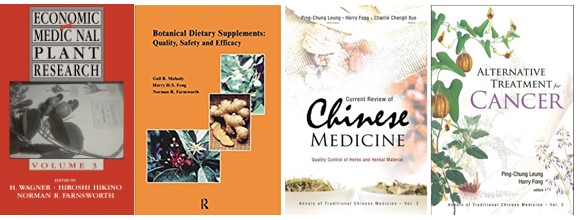
- Wagner H, Hikino H, Farnsworth NR. Eds. Economic and Medicinal Plant Research, Vol. 1-3, Academic Press, 1986-1989.
- Wagner H, Farnsworth NR. Eds. Economic and Medicinal Plant Research, Vol 5 (1991); Vol 6 (1994). Academic Press.
- Mahady GB, Fong HHS, Farnsworth NR. Botanical Dietary Supplements: Quality, Safety and Efficacy. Lisse, Swets & Zeitlinger, 2001.
- Leung P-C, Fong H, Xue CC. Eds. Annals of Traditional Chinese Medicine, Vol. 2. Current Review of Chinese Medicine. World Scientific, Singapore, 2006.
- Leung P-C, Fong H. Eds. Annals of Traditional Chinese Medicine, Vol. 3. Alternative Treatment for Cancer. World Scientific, Singapore, 2007.
Organization of the WHO TRM CC/UIC
Organizationally, the WHO TRM CC/UIC is a college-wide unit, reporting to the Dean of the College of Pharmacy (COP), who serves as the Chief Executive Officer (CEO) of the unit. The Chief Operation Officer (COO) of the WHO TRM CC/UIC is the Director (Prof. Chun-Tao Che), aided by a Co-Director (Prof. Guido F. Pauli). All faculty members in the COP are serving members of the TRM CC/UIC, who are recruited to perform specific assignments appropriate to their expertise. However, given that the faculty members whose academic and research interests encompass traditional medicine/herbal medicine/dietary supplements/drug discovery from plants and other natural sources are pharmacognosists, medicinal botanists, and pharmacologists/biologists, the most active members of the CC have been drawn from the faculty members of the former Department of Pharmacognosy and Pharmacology, prior to COP’s reorganization of its departments and research units in 1982. Subsequently, these faculty members were housed in the Program for Collaborative Research in the Pharmaceutical Sciences (PCRPS), a collegiate research unit staffed with faculty and academic appointees in the Departments of Medicinal Chemistry and Pharmacognosy (2011-2019) and Pharmaceutical Sciences (2019-today). Since 2020, the WHO TRM CC/UIC has been administratively housed under the Pharmacognosy Institute in the College of Pharmacy.
CEO
Glen Schumock, Professor and Dean, UIC College of Pharmacy
Director
Chun-Tao Che, Harry H.S. Fong Professor of Pharmacognosy; chect@uic.edu
Co-Director:
Guido F. Pauli, Norman R. Farnsworth Professor of Pharmacognosy; gfp@uic.edu
Member, WHO Expert Advisory Panel for Traditional, Complementary and Integrative Medicine
Harry H.S. Fong, Emeritus Professor of Pharmacognosy
Contact
UIC WHO Collaborating Centre for Traditional Medicine, University of Illinois at Chicago College of Pharmacy, 833 South Wood Street, Chicago, Illinois 60612, USA; Phone: +1 312 996-5234 (C.T. Che); +1 312 355-1949 (Guido F. Pauli); Fax: +1 312 996-7107.
Email Contacts: chect@uic.edu (C.T. Che) and gfp@uic.edu (Guido F. Pauli)
History of WHO TRM CC/UIC and the WHO Traditional Medicine Programme
Historically, the WHO’s programme in traditional medicine evolved from a 1972 meeting held at the WHO headquarters to develop training programs, research, and studies that could improve the services of traditional birth attendants, and a subsequent series of working group meetings to include other traditional medicine practices. In 1976, a working group was established for the promotion and development of traditional medicine, which ultimately led to the formal establishment, at the end of that decade, of a permanent WHO Programme in Traditional Medicine (WHO TRM) to be executed in close collaboration with WHO regional offices, with Dr. R.H. Bannerman serving as the first Programme Manager.
UIC’s first participation in the programmatic activities of the WHO TRM was in November 1978, when the late Professor Norman R. Farnsworth was invited to participate and served as Rapporteur at the invitation of Dr. Bannerman at a working group meeting entitled, “Consultation on Potentials for use of Plants Indicated by Traditional Medicine in Cancer Therapy”. Other programmatic activities ensued, including a consultative site visit to UIC College of Pharmacy by Dr. Bannerman (1979, Figure 1), culminating in the designation of UIC College of Pharmacy as a World Health Organization Collaborating Centre for Traditional Medicine (WHO TRM CC/UIC), shortly after the establishment of this network by the WHO, initially for a three year period (1980-1983), and has subsequently been renewed regularly. Our Centre was one of the ten designated WHO CCs for TRM in the original network, comprising of institutions in AFRO (4), AMRO (3), EURO (1), and SEARO (2).
In 2020, our Centre was renamed as the World Health Organization Collaborating Centre for Herbal Medicines, and it remains one of such centres with the longest history and the only in the North America.
